| In the world’s fastest-growing Internet market, Chinese Communist authorities are trying hard to regulate online speech |
| “Mao Zedong said that to have power you need two things: the gun and the pen … The Communist Party has the gun, but the Internet is now the pen. If they lose control of it, something will happen to challenge their authority.” –Guo Liang, Chinese Academy of Social Sciences, Beijing, in an interview with CPJ. On June 3, 2000, police in Chengdu arrested the founder of China’s first human-rights Web site, www.6-4tianwang.com. Huang Qi was accused of “subverting state power,” a charge that could land him in jail for ten years. Seconds before his arrest, Huang posted a final bulletin to his site. “There is a long way in front of us,” he wrote. “Thank you all, thanks to everybody devoted to democracy of China. They are here now (the policemen), so long.” Huang is one of seven people arrested for Internet-related “crimes” in China since 1998. He was still in jail at the end of 2000, but supporters quickly copied his site to a U.S. server, and its content remained accessible from China in early January. Even so, such arrests have a deterrent effect. “You don’t have to arrest too many people before everyone gets the message,” said an American newspaper correspondent in Beijing. “The government here is very good at intimidation.” In Russia, much of the Middle East, Cuba, and dozens of other countries around the world today, the Internet is a battleground between citizens who want to express themselves and governments who want to restrict online speech and use information technology to spy on their citizens. China is a crucial test case in this global struggle because it is one of the world’s fastest-growing Internet markets. But a rash of new Internet regulations demonstrate that the Communist government is determined, however quixotically, to maintain control over the Web. Net threat “The role and power of the newspapers consists in their ability to bring the Party program, the Party line, the Party’s general and specific policies, its tasks and methods of work before the masses in the quickest and most extensive way,” Mao Zedong told the editorial staff of a newspaper in Shanxi province in 1948. Suiting his actions to his words, the Great Helmsman quickly imposed strict Party control on editorial staffs at all radio stations, newspapers, and magazines. With the economic reforms of the last twenty years, the socialist ideology that motivated the revolution is largely gone, replaced by a new devotion to free enterprise and the desire for broader trade relations. The media, however, have remained one of the last bastions of old-style Communist rule. As a result, Communist China has never allowed private citizens, let alone foreigners, to own newspapers or broadcast outlets. The Internet is less easy to control, and that’s why hungry entrepreneurs and wired-age visionaries alike see today’s China as a dream come true. Closed for half a century in a state of perpetual socialist revolution but now wide open to global commerce, China has been hyped as the ultimate digital frontier, a vast nation of eager Netizens anxious to trade news and ideas as well as goods and services. During a recent visit to Beijing and Shanghai, CPJ found ample evidence that students, entrepreneurs, and even state employees were using the Internet as freely as they possibly could. China’s Communist leaders, on the other hand, have been ambivalent about the Internet: they want the economic benefits of e-commerce, but they fear the political consequences of an open information economy. “We should … recognize the tremendous power of information technology and vigorously promote its development,” President Jiang Zemin told delegates to an international computer conference in August. “The melding of the traditional economy and information technology will provide the engine for the development of the economy and society in the 21st century.” At the same conference, Jiang railed against ideas that “make people uneasy: anti-science, false science and information that is unhealthy to the point of being downright harmful.” He also called for the creation of an “international Internet pact” to promote “safe management of information.” Digital revolution Billions of dollars in local and foreign investment are riding on the Internet experiment in China, with entrepreneurs betting that the information economy will eventually yield a massive payoff. [See note 1] But if the entrepreneurs are taking a big financial risk, the Communist Party is taking a bigger political risk. “The Internet is having a very, very strong impact on society,” said Chen Tong, a senior editor at the popular Chinese portal site Sina.net. “In the 1970s … it could take months for people to receive news of something big happening. Now … people know what is happening within hours.” Even more worrying to the authorities, people are using the Internet to express independent political opinions. “The atmosphere … on the Internet is far more free than the atmosphere in our country generally,” said a student at Beijing University, commonly known as Beida. “When you are in front of a computer no one can control your soul or your spirit.” The bulletin boards of the People’s Daily Web site, the Party’s official voice in cyberspace, are frequently filled with sharp criticisms of the government, which staffers hastily remove. And among employees of state-controlled newspapers, Web sites, and think tanks, as well as the general population, there is widespread use of “proxy servers” (see below) and other strategies to access Web sites that the government has tried to block. Even with politics banned at universities and students barred from gathering for unofficial demonstrations, the Internet sometimes plays a role in sparking small-scale protests. Shortly before June 4, 2000, the 11th anniversary of the Tiananmen massacre, a female Beida student was killed in a criminal assault. Because of the sensitive anniversary, university officials refused to let outraged students hold a funeral gathering on campus. Instead, students organized an online memorial using the university’s electronic bulletin board service. More than 1000 people logged on to pay tribute to their classmate and call for better campus security. Rules and regulations And although the Falun Gong spiritual movement is officially classified as a social evil, information about the movement is readily available from a number of sites. CPJ was even able to download pictures of the Tiananmen Square massacre, although most Tiananmen-related dissident sites were blocked. “People frequently ask me, who decides what to block? Who is in charge of this?” asked Guo Liang, a philosophy professor and Internet expert at the prestigious Chinese Academy of Social Sciences in Beijing. “I haven’t the faintest idea. Nobody knows.” In August 2000, the official Xinhua news agency reported that the eastern province of Anhui had set up a special police force to monitor Internet “crimes.” Twenty other provinces are creating similar forces, according to the state news agency Xinhua, with the task of curbing pornography and “maintaining order” on the Internet. Meanwhile, criminal statutes have been revised to allow for the prosecution of subversive activity online. Existing laws covering state security and secrecy allow the authorities to jail people for a wide range of Internet-related offences. But in October and November, 2000, after years of internal debate, the government issued two sets of regulations that specifically govern ownership, content, and other aspects of Internet usage. The first set of rules, issued on October 1, limits direct foreign investment in Internet companies and requires companies to register with the Ministry of Information Industry and apply for permission before issuing stock or signing any agreement with a foreign investor. [See note 2] Article 15 bans the dissemination of any information that might harm unification of the country, endanger national security, or subvert the government. Promoting “evil cults” (an unsubtle reference to Beijing’s campaign against Falun Gong) is similarly banned, along with material that “disturbs social order or undermines social stability.” Other articles ban the distribution of pornography or “salacious material,” along with anything that harms “the honor and interests of the state.” [See note 3] The regulations also cover chat rooms, a popular feature of many Chinese sites. In recent years, even government sites have attracted lively conversations in their chat rooms, where the anonymity of cyberspace fosters discussion of taboo topics such as democracy and the shortcomings of the ruling elite. Under the new rules, however, all service providers must monitor content in the rooms and restrict controversial topics. Yet another regulation requires Internet café patrons to register with “software managers” and produce a valid ID card in order to log on. Both rules are routinely ignored. In a grimy residential neighborhood a few miles from the stately Stalinist squares of official Beijing, Lei, a 22-year-old engineering student, showed CPJ how to surf the Web for contraband. While a bored clerk minded the small Internet café, Lei searched for Web sites about the Tiananmen Square massacre. Every site was blocked. “Never mind,” Lei said, surfing instead for Falun Gong sites. But sites devoted to the banned Chinese meditation movement were also blocked. Lei (not his real name) then opened an e-mail from Falun Gong supporters in the United States. The message contained a long list of proxy servers that allowed him to bypass China’s firewall, the regime’s first line of defense against unwanted Internet content. (In this context, a “proxy server” is an anonymous relay computer outside the Chinese firewall. Chinese users log on to the proxy server, which in turn logs on to the blocked site, thus fooling the government’s site-blocking software.) Soon, Lei was browsing through documents about Tiananmen on blocked Chinese dissident sites, and catching up on Falun Gong news at the supposedly blocked New York Times site. If he wanted to, Lei explained, he could even ogle pornography online. The entire process took about 30 minutes. “We have to be careful about Falun Gong,” cautioned Peng (not his real name), another student. “They really don’t like that. But the information is there, [so] why can’t we see it? We treat this like a game.” Lei and his friends are probably a minority among Chinese Internet users. “Few people seem to be interested in politics, what is the point?” said an on-line editor at a government Web site. “They can’t do anything to change things.” Indeed, several students said they spent most of their online time in social chat rooms. “My studies are boring, there is not enough going on in school,” said Wu, a female student. She sometimes meets people through the Internet, she said, but is dismayed that chat rooms, which draw millions of Chinese, are so often used for sex talk and liaisons. “There is something empty in people’s lives and they are looking for something new, something else,” she said. “Sex, there is so much sex, it’s kind of sad.” The new regulations also turn Internet service and content providers into de facto government spies. Article 14 requires all ISPs to record “the time of … subscribers’ access to the Internet, the subscribers’ account numbers, the addresses or domain names of the Web sites, and the main telephone numbers they use.” Internet content providers, meanwhile, are required to maintain logs of all information posted on their sites. Both ISPs and content providers must keep their records for 60 days and turn them over to “the relevant state authorities” on demand. Violators face punishments ranging from fines of up to US$120,000 to mandatory closure. Many Internet players shrug off the new restrictions. “You have to remember there is a relatively short half-life to Chinese regulations,” said American lawyer Howard Chao Shang, who works in the Shanghai office of the U.S. law firm O’Melveny & Meyers. “It seems like a big deal now but in a few months it will start to fade away and be forgotten. Not too many years ago, you needed a license to own a fax machine or a modem in China. I bet those laws are still on the books.” China with the Internet is certainly a freer place than China without the Internet. For the first time, “unofficial” news is circulating all over the country. As a result, millions of people have gained access to information and ideas that would have been unimaginable a generation ago. But the Communist Party is still firmly in control of China’s political superstructure. The new Internet regulations serve as a reminder that the commissars are both ready and willing to slam the door on independent speech. Censorship Under the new rules, only state media are allowed to set up news sites, and only with permission from the State Council Information Office, a Cabinet-level agency tied to the Communist Party’s Propaganda Ministry. The Information Office handles content issues, while the Ministry of Information Industry looks after service and access issues. To avoid trouble, Chinese Web sites sometimes shut down their chat rooms in advance of sensitive dates like the Tiananmen anniversary–with millions of dollars at stake, the major players in China’s burgeoning online economy try not to offend the government. “Eventually, some day, information will be free in China,” said a senior content editor at one of China’s biggest portals, speaking on condition of anonymity. “But for now [we all] know what the limits are.” The editor noted that visitors to his site often post dissenting political commentary on the popular bulletin board. But even before the new regulations were posted, he said, in-house editors (known as “Big Mamas” in Chinese) had been removing controversial posts as soon as they were spotted. His competitors were no different. In September, Shanghai officials announced they would close down half the city’s 1000 cybercafés, which a local government official had accused of corrupting local youth by providing access to “primitive” (i.e., pornographic and/or subversive) online content. Elsewhere, authorities have closed smaller sites for posting unapproved material, a practice that seems likely to spread now that formal restrictions are in place. Relative freedom This resistance to an open information regime is not simply bureaucratic intransigence, however. The chaotic history of modern China, from the collapse of the last imperial dynasty through the madness of the Cultural Revolution, has left many Chinese craving stability rather than freedom. “You must remember our history,” said Ke Guo, an associate professor of journalism at Shanghai International Studies University. “China is going to develop the Internet, but we do not know whether it will be with the kind of unfettered press freedom that Western experts want. Maybe we do not want that kind of freedom.” NOTE 1: International investors dodge legal restrictions on foreign ownership of Chinese Internet enterprises by pouring capital into offshore subsidiaries that the Chinese companies have set up in the Cayman Islands and elsewhere. NOTE 2: “Measures for Managing Internet Information Services”, Beijing, October 1, 2000. NOTE 3: Article 14. An IIS provider providing services relevant to news information, publishing business, and e-announcements shall record the contents of the information, the time the information is released, and the address or the domain name of the Web site; and an Internet Service Provider (ISP) shall record such information as the time of its subscribers’ access to the Internet, the subscribers’ account numbers, the addresses or domain names of the web sites, and the main telephone numbers they use. An IIS provider and the ISP shall keep a copy of their records for 60 days and show them to the relevant state authorities when they want to see these records. “Article 15. IIS providers shall not produce, reproduce, release, or disseminate information with the following contents:
|
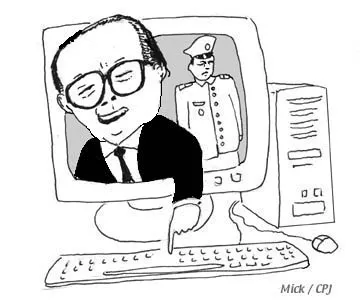
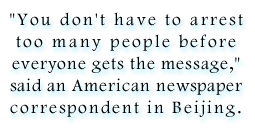 Earlier, Beijing authorities had commended Huang after his Web site helped find thousands of women who had been abducted in rural China and sold into marriage. More controversially, the site criticized the Tiananmen Square massacre of June 4, 1989, when the Chinese army opened fire on pro-democracy demonstrators in central Beijing. Huang also exposed a racket that was forcing Chinese fishermen to undergo appendectomies, apparently so that local officials could make money from the surgery.
Earlier, Beijing authorities had commended Huang after his Web site helped find thousands of women who had been abducted in rural China and sold into marriage. More controversially, the site criticized the Tiananmen Square massacre of June 4, 1989, when the Chinese army opened fire on pro-democracy demonstrators in central Beijing. Huang also exposed a racket that was forcing Chinese fishermen to undergo appendectomies, apparently so that local officials could make money from the surgery.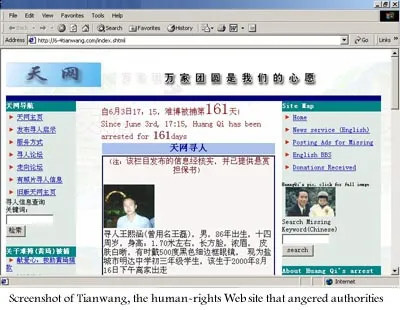 Mao and his planned central economy are both long gone, but the Communist Party’s views on the proper role of socialist media have changed little over the past half century. “Media is the last thing they will let go,” said a Western correspondent who has lived in China for many years. “They remember how they came to power.”
Mao and his planned central economy are both long gone, but the Communist Party’s views on the proper role of socialist media have changed little over the past half century. “Media is the last thing they will let go,” said a Western correspondent who has lived in China for many years. “They remember how they came to power.”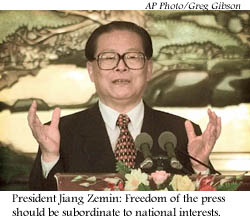 Jiang went even further in a September, 2000 interview with CBS News correspondent Mike Wallace. “Freedom of the press should be subordinate to the interests of the nation,” he said. “How can you allow such freedom to damage the national interests?” Acknowledging that many foreign news sites have been banned in China because of their political content, he said, “We need to be selective. We hope to restrict as much as possible information not conducive to China’s development.”
Jiang went even further in a September, 2000 interview with CBS News correspondent Mike Wallace. “Freedom of the press should be subordinate to the interests of the nation,” he said. “How can you allow such freedom to damage the national interests?” Acknowledging that many foreign news sites have been banned in China because of their political content, he said, “We need to be selective. We hope to restrict as much as possible information not conducive to China’s development.”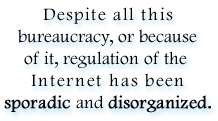 Despite all this bureaucracy, or perhaps because of it, government regulation of the Internet has been sporadic and disorganized. During CPJ’s visit to China, The New York Times site was blocked, but Times articles on China appeared on the unblocked International Herald Tribune site. Many dissident sites were blocked, but not all. The site for Human Rights in China, a U.S.-based dissident group, was not blocked. CPJ’s site (www.cpj.org) was accessible, but Human Rights Watch (www.hrw.org) was blocked. Time magazine’s site (www.time.com) was blocked, along with CNN.com. But the Far Eastern Economic Review site (www.feer.com) was not blocked, even though it often features blistering critiques of the Chinese government.
Despite all this bureaucracy, or perhaps because of it, government regulation of the Internet has been sporadic and disorganized. During CPJ’s visit to China, The New York Times site was blocked, but Times articles on China appeared on the unblocked International Herald Tribune site. Many dissident sites were blocked, but not all. The site for Human Rights in China, a U.S.-based dissident group, was not blocked. CPJ’s site (www.cpj.org) was accessible, but Human Rights Watch (www.hrw.org) was blocked. Time magazine’s site (www.time.com) was blocked, along with CNN.com. But the Far Eastern Economic Review site (www.feer.com) was not blocked, even though it often features blistering critiques of the Chinese government.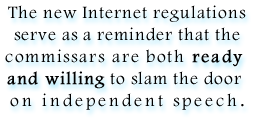 One foreign executive with a Chinese portal site explained that all Chinese media face content restrictions, and that few investors expected the Internet to be an exception to the rules. “There’s very little impact, and little to be concerned about,” he said. “The bottom line: the new regulations don’t make anyone happy, but they’re completely expected and in line with other Chinese government policies. Anyone who was not already in de facto adherence with the policies was being very naïve.”
One foreign executive with a Chinese portal site explained that all Chinese media face content restrictions, and that few investors expected the Internet to be an exception to the rules. “There’s very little impact, and little to be concerned about,” he said. “The bottom line: the new regulations don’t make anyone happy, but they’re completely expected and in line with other Chinese government policies. Anyone who was not already in de facto adherence with the policies was being very naïve.”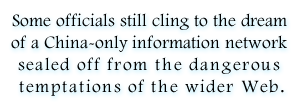 Despite the official policy of openness suggested by China’s pending entry into the World Trade Organization, some officials still cling to the dream of a China-only information network sealed off from the dangerous temptations of the wider Web. “China must build a national network that is independent of the Internet,” said Jiang Zemin’s son Dr. Jiang Mianheng, a tech-savvy vice president of the Chinese Academy of Sciences, at a conference in Shanghai last June. According to local media, Dr. Jiang added that the mainland must break the Western world’s “monopoly on information resources and related industries.”
Despite the official policy of openness suggested by China’s pending entry into the World Trade Organization, some officials still cling to the dream of a China-only information network sealed off from the dangerous temptations of the wider Web. “China must build a national network that is independent of the Internet,” said Jiang Zemin’s son Dr. Jiang Mianheng, a tech-savvy vice president of the Chinese Academy of Sciences, at a conference in Shanghai last June. According to local media, Dr. Jiang added that the mainland must break the Western world’s “monopoly on information resources and related industries.”